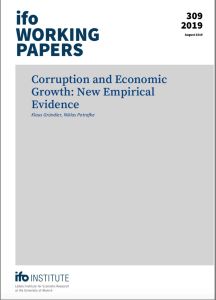Join getAbstract to access the summary!

Join getAbstract to access the summary!
Klaus Gründler and Niklas Potrafke
Corruption and Economic Growth
New Empirical Evidence
Ifo, 2019
What's inside?
Does corruption “grease the wheels” of growth, or does it throw sand into the gears of an economy?
Recommendation
Does corruption “grease the wheels” of growth, or does it throw sand into the gears of an economy? The links between corruption and economic growth have never been well-defined. While many observers believe some degree of malfeasance can actually help when it sidesteps ineffective regulation, others hold that corruption blocks a nation’s economic progress by stifling its output and innovation. Economists Klaus Gründler and Niklas Potrafke, in this technical analysis for academics and students of political economy, offer new data that help shed light on this important question.
Summary
About the Authors
Klaus Gründler and Niklas Potrafke are economists at the ifo Institute – Leibniz Institute for Economic Research at the University of Munich.



















Comment on this summary